Last updated on 03/10/2016
Elevator version: John Bonine and Kevin Reed and the Senate had a civil, collaborative, and productive session on the counseling confidentiality motion and the GCO amendment. Many interesting issues came out, thanks to the full engagement of the Senate. Some issues were dealt with expeditiously with new amendments, generally unanimously. Given the April 1 deadline for the emergency policy to expire, the Senate passed the policy with the GCO amendments, after additional needed amendments that arose during the discussion. The Senate will come back to polish it up in a few weeks, if needed, after more discussion with the GCO. This really could not have gone better, and will stand as an example of shared governance at its best.
Browsing Room, Knight Library; 3:00-5:00 pm
3:00 pm Introductory Remarks, Senate President Randy Sullivan
3:05 pm 1. Call to Order
3:05 pm 2. Approval of Minutes 2.1 February 24, 2016
3:15 pm 4. New Business
4.1 US15/16:20: Approval of Curriculum Report, Winter Term 2016; Frances White, Chair of Committee on Courses
Yes, this proposal does include a new undergraduate Law course that double-dips on the Gen Ed and MC requirements and will suck off more CAS students:
LAW 301 Youth and Social Change (4) Explore how adults act on youth through law, mass media, policy, and social science, while investigating youth as agents of change, acting on their own perspective of law and justice. Approved to satisfy Category II: Social Science general-education group requirement. Approved to satisfy Category B: Identity, Pluralism, and Tolerance multicultural requirement. Effective spring 2016.
Really? I’m an economist and I’m not even sure that’s a science. But now law is too? I’ve got a request in for the syllabus and justification for SocSci and MC status. At least it’s not online with no proctored exams, like Doug Blandy’s AAD courses. FWIW here is the criteria for Gen Ed status:
The following criteria was proposed by the Undergraduate Council and the College of Arts and Sciences Curriculum Committee. The University Senate approved them in May 2001 by Motion US0001-3 Replacement Motion governing the approval of courses meeting general-education requirements and the distribution of courses student must complete within each group. Revised May 11, 2011 to authorize general education credit for courses waiting for permanent numbers. Revised May 22, 2013 to make clear that repeatable courses are not assigned groups satisfying status. Revised May XX, 2015 to remove the Inter-College General Education Review Committee (ICGER) from the review and approval process.
1. Group-satisfying courses in Arts and Letters, Social Science, and Science must meet the following general criteria:
1.1. Group-satisfying courses in arts and letters must create meaningful opportunities for students to engage actively in the modes of inquiry that define a discipline. Proposed courses must be broad in scope and demonstrably liberal in nature (that is, courses that promote open inquiry from a variety of perspectives). Though some courses may focus on specialized subjects or approaches, there must be a substantial course content locating that subject in the broader context of the major issues of the discipline. Qualifying courses will not focus on teaching basic skills but will require the application or engagement of those skills through analysis and interpretation.
1.2. Group-satisfying courses in the social sciences must be liberal in nature rather than being professionally oriented or limited to the performance of professional skills. They must cover a representative cross-section of key issues, perspectives, and modes of analysis employed by scholars working on the subject matter addressed by the course. The subject matter of the course will be relatively broad, e.g., involving more than one issue, place, or time. Courses with an emphasis on methods and skills will satisfy the requirement only if there is also a substantial and coherent theoretical component.
1.3. Group-satisfying courses in the sciences should introduce students to the foundations of one or more scientific disciplines, or should provide an introduction to fundamental methods (such as mathematics) that are widely used in scientific disciplines. Courses should introduce students to the process of scientific reasoning.
No discussion, passes unanimously.
4.2 US15/16-17: Policy on Confidentiality of Student Health Care and Survivors’ Services Information; Senate Executive Committee
The GCO has proposed redlined revisions to the emergency policy, here. The money graph is in the definitions at the end, although I think there will be new revisions from the GCO proposed at the meeting.
Yes, there is a new amendment from the GCO, replacing that above. It’s on the Senate screen now, I’m trying to find a link to it. Sorry.
Bonine: Motion to divide the amendment and approve the 2nd paragraph. Passes unanimously.
On to the first paragraph: Burns has questions about the “firewall”. GC Reed discusses the “risk management team” and a situation where it might help deal with, say, a suicidal student.
Harbaugh asks if the “risk management team” would also include GCO reps dealing with malpractice. Reed says yes. Health Center Director Richard Brunader, MD explains his motivation for the amendments – allow his practitioners access to legal advice. [Sounds reasonable, but so long as the GCO provides that advice, which may require info from the counseling records, and also defends UO, the firewall seems flammable.]
Bonine: The amendment is not for litigation situations, correct? Reed: Correct. Bonine points out that the amendment will modify paragraph 3, which deals explicitly with litigation. Bonine suggests a simple amendment to the amendment to fix this issue so that the providers can get legal advice when they need it, without allowing GCO to get records in litigation like Jane Doe.
Reed: Thinks this creates a potential problem. Bonine points out it doesn’t.
Freyd: Don’t practitioners have malpractice insurance and access to independent legal advice outside the GCO?
[Missed name] points out that the original GCO amendment uses “student” instead of “patient/client”. Problematic. We’ll need another amendment to the amendment.
Ahlen: So the GCO amendment would allow the release of redacted student records w/o their consent?
Reed: Yes.
Espinoza: Let’s step back. What’s the problem that needs to be addressed?
Reed: Practitioners need legal advice. Emergency policy doesn’t seem to allow that.
Brunader: Recent case – parent called, I couldn’t figure out if I could talk to them, or how or if I could get advice about this from the GCO.
[This has been a very interesting and I think productive discussion.]
Randy suggests a motion to postpone.
Reed: I’ve discussed with Schill, we want to get this done today.
Psaki: The GCO asked the Senate to approve an amendment that we didn’t see on screen until today. We deserve more time.
Bonine: We can postpone this til 4/6, we’ve been working with the GC collaboratively.
But it will expire 4/1.
Ahlen: Pass today, with the understanding that we’ll tweek in collaboration with GCO?
Bonine: Sounds good to me. Reed: Sounds good to me too. Schill likes it too.
Dreiling moves to replace student with client/patient. Passes unanimously.
Bonine: One more amendment. In Paragraph 4, “officials” changed to “employees” in the last sentence, so that a counselor or doctor could ask for the University to pay for an independent lawyer.” Passes unanimously.
Revised policy passes unanimously. Very productive, collaborative work by GCO Kevin Reed, John Bonine, and the Senate as a whole.
4.3 US15/16-21: Revision of the Code of Ethics in Response to Feedback from the University President; Senate Executive Committee
Sullivan postpones on the grounds no one cares about this policy.
3:45 pm 5. Open Discussion 5.1 Proposed Mandatory Live In policy for all new incoming students.
Max Burns (UO student, Senator, ASUO Senator).
Argues that this will be a big cost increase for incoming UO students, on top of tuition increases. Low income students hit particularly hard.
On process grounds, argues that the university should have done more due diligence.
ASUO has voted against this.
Ahlen: Students have been asking about exemptions. Is housing prepared to provide culturally appropriate services to international students, for example.
Sullivan: Can VPSA Holmes tell us where this policy is?
Holmes: This was Mike Gottfredson’s idea, motivated by financial concerns from Housing when live-in rates fell below 80%. [Yes, she really said that.] It’s already approved policy and will go into effect in 2017. We can’t afford to the bond payments for renovating dorms unless we can make the students use university housing.
Sullivan to Freinkel: Who was on the review committee you chaired? Robert Davis (Spanish), Middlebrook (English) and a bunch of administrators including the Associate Athletic Director (?!). Committee was unanimous in support. [Anyone know where the actual policy is?]
Sullivan asks Freinkel to forward the research used to support the policy.
4:15 pm 6. Reports 6.1 Report from Faculty Athletics Representative (FAR); Tim Gleason
Gleason’s report is full of interesting information and omissions. Way better than O’Fallon, but that was a low bar. Not in his report:
The NCAA reported in November that only 17% of the Black Male athletes who started at UO in 2008 had graduated 6 years later. Only 44% of all Black Male students (includes athletes) entering UO in 2008 graduated:
For comparison 67% of all students entering as freshman in 2008 had graduated from UO w/in 6 years. This is the most recent data. The cell sizes for gender/race are small, and percentages bounce around a lot. 17% is, from what I can tell, the historical low point for the Duck athletic department. The average is more on the order of 45%.
Gleason’s position on transparency has been problematic: https://uomatters.com/2015/04/kim-sheehan-advertising-and-tim-gleason-far-boot-prof-from-private-pagia-meeting.html but maybe he’ll turn the page on that.
Here’s what I asked him to provide to the Senate:
FAR Report to Senate:
Written report distributed 48 hours in advance, with Q&A at meeting and by email if time pressure.
Distribution of majors, online classes, classes transferred from other schools to meet UO requirements.
Admissions: Gleason not involved in admissions. Senate will want to see data on entering students including GPA/SAT etc. Tim will try to get these from Admissions.
In general all data broken out by team, or by gender & revenue/non-revenue. Berkeley as a model. Gleason will clear FERPA with GCO.
Well-being: Time demands, travel schedules, procedures for checking for academic conflicts.
O’Heroes – rules and time demands?
Follow-up after graduation – What happens to UO athletes after they’re done?
NCAA violation reports.
Heads up on coming NCAA legislation and outcomes of Jan convention. Senate/IAC should have input into UO’s position on these matters.
Update on AD efforts to prevent sexual violence.
Gleason: Three messages… Stay calm, all is well, but we’ll face challenges. Looks at distribution of majors, doesn’t see any funny business. 11% of athletes were “special admits”.
FWIW, here’s an example of the contract that the Ducks give their “student-athletes”. (This one is Brandon Austin’s, from his lawsuit against Mike Gottfredson et al.:)
Balbuena, Psaki, and other senators press Gleason on his claims that all his well, and that all that can be done is being done.
That said, a huge improvement from O’Fallon. Thanks Tim.
4:50 pm 7. Notice(s) of Motion
Dreiling: Motion on academic standards for online Gen-Ed courses.
4:50 pm 8. Other Business
5:00 pm 9. Adjournment
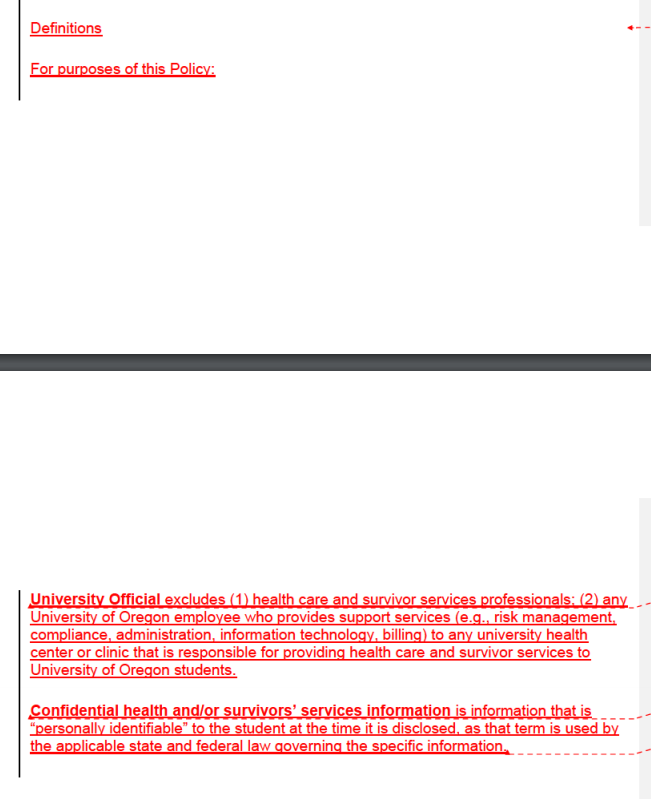
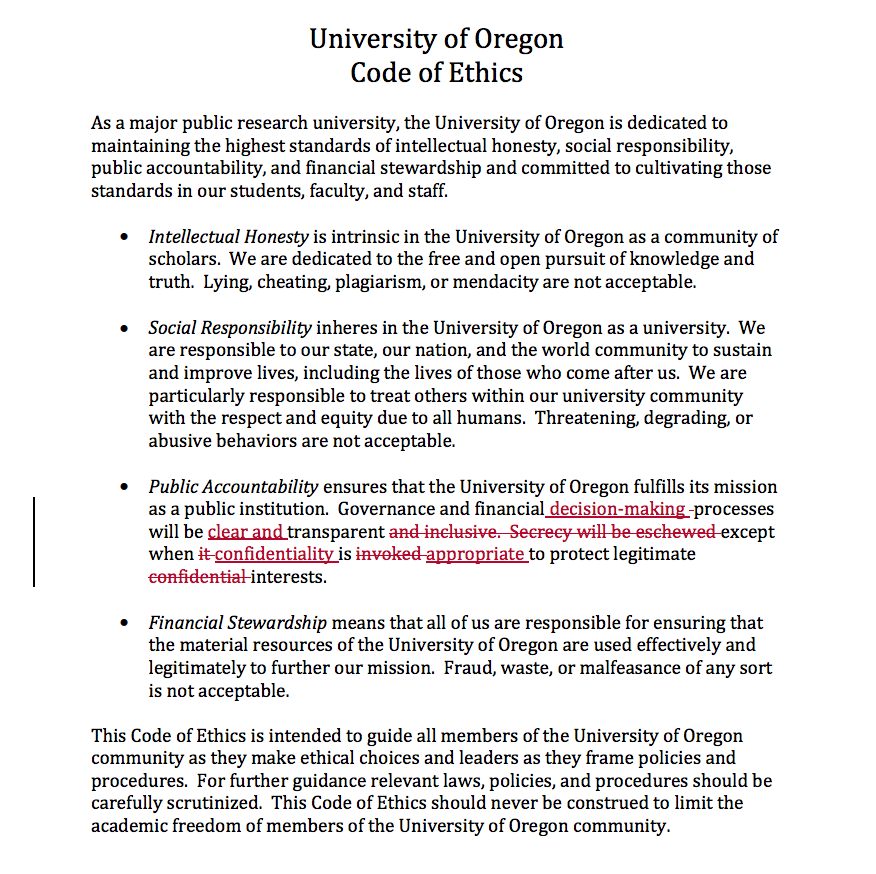
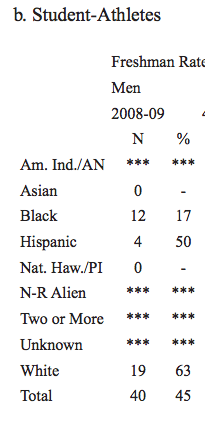
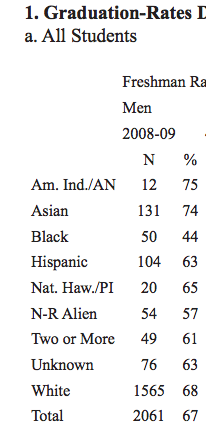
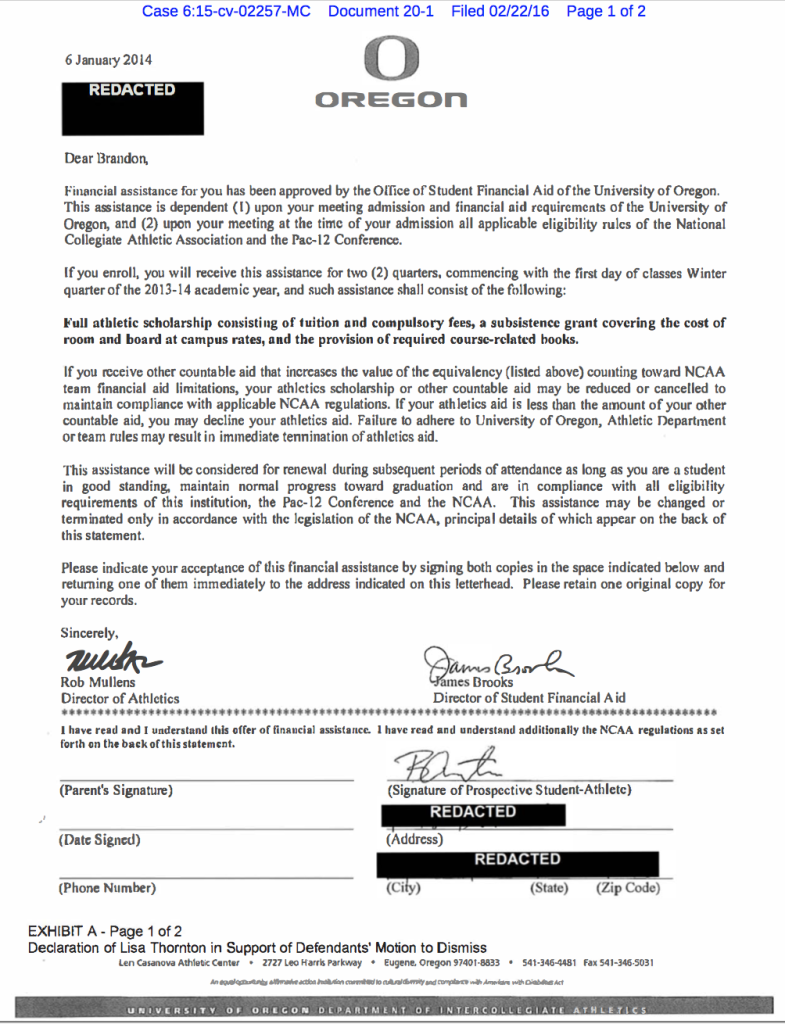
When will the Senate start to champion the real academic issues facing the University? Annual tuition increases are way too large, class sizes continue to grow, faculty hiring outside the anti-democratic cluster hires has stalled, administrative pet projects are proliferating, total grad student numbers and support remain dismal, classified staff and OAs continue to be terrorized by their superiors, morale has never been lower, and administration size and salaries are on the upswing despite the current series of disingenuous and unnecessary cuts. How about working on these?
Questions on the mandatory dorm living:
Overall concern about chilling affect on students of limited means: dorm living is expensive.
Hopefully will contain the same exception as OSU’s policy for local students living with family/guardians and attending the UO.
Also exceptions for students who have children or **who are caretakers for parents or other dependents!
Also some students do not thrive in group living due to close contact, noise, dorm food issues, etc. How will this be addressed?
Oregon Pathways covers tuition. What about dorms, foodplans and fees which together are probably MORE than tuition. What support is there?
This is absolutely horrible. I have known many students who could not afford to live on campus, this will break many. A close friend of my child very nearly was not able to be on campus for freshman year. I fear some of the committee members may not know what it is like to be low income.
Regarding the Policy on Confidentiality of Student Health Care, etc. It seems as though some are, once again, attempting to bypass state legal protocol – attempting to give certain people access to records they have no right to. Who is making sure that these procedures adhere to the new SB 1558? Especially when I see item #2 that says “in response to an actual or anticipated lawsuit, the University will implement a litigation hold.” The word here that is worrisome is “anticipated”. That was the path that led to the release of the counseling center records.
As for LAW 301, at least it is taught by a tenured member of the Law Faculty (at least in S’16). And finally they are regularizing their offerings through the normal course approval process, instead of just teaching under experimental numbers–which is the case for all the (many) other ocurses being offered in S’16.
(Note to UOM: if you make the Law courses jump through extra, public hoops as compared to, say, Anthro or EdStudies or ArtHist courses, they’re just less likely to submit any more–and nothing prevents them from continuing to use experimental numbers.)
Re: “Nothing prevents them from continuing to use experimental numbers”.
Except the rules:
From the committee on courses:
“A course may be offered under an experimental number for a maximum of three years, at which time it must be either submitted for permanent approval or dropped from the department course offerings.”
oh we all violate that simply by changing the course title under the experimental number
Some in our department have been teaching the same “experimental” course under 410s and 399s variously with slight title changes and curricular tweaks since last century. It’s easy to break that rule.